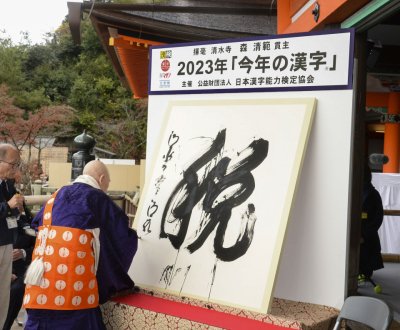2023 Kanji: Zei, the tax
The Japanese Character Of The Year And Its Meaning
⏱ 2 minutes
Since 1995 at the end of the year, Japaneses vote for what they consider the "kanji" of the year. The Japanese language uses more than 2,000 kanji characters, that are at the core of its writing system.
In 2023, the elected kanji is 税 / zei, meaning "tax". It was chosen in reference to talks on taxation reduction to help Japanese households’ finances in a high inflation context, and to the new invoice system implemented this year to freelance workers.
As usual, the kanji of the year was officially revealed and its calligraphy performed at the wonderful Kiyomizu-dera temple in Kyoto.
Kanji selected over the previous years
- 2022: 戦 (sen, ikusa, war), in reference to the war in Ukraine and North Korea’s missile launches.
- 2021: 金 (kin, gold) after the Japanese athletes’s unprecedented gold medals harvest at Tokyo’s Olympics (27) and Paralympics (13), but also for other internationally renowned Japanese champions such as Shohei Ohtani.
- 2020: 密 (mitsu, promiscuity) along with the expression san mitsu (3密) describing the 3 situations to avoid in order to stop the Covid-19 pandemic.
- 2019: 令 (rei, beauty or order) to commemorate the beginning of Emperor Naruhito’s era, whose era name is Reiwa (令和).
- 2018: 災 (sai, natural disaster) following the various disasters that hit Japan in 2018: earthquakes, torrential rains, out of the ordinary typhoons, heat waves, etc.
- 2017: 北 (kita, the north) for North Korean missile launches and the north of Kyushu Island devastated by violent rainfalls.
- 2016: 金 (kin, gold) for the 12 gold medals won by Japan at the Rio Summer Olympics, but also in reference to the distinctive hair of Donald Trump, who was elected president of the United States in late 2016.
- 2015: 安 (an, safety / security) in reference to Prime Minister Shinzo Abe’s revision of the constitution to reinforce the country’s security.
- 2014: 税 (zei, tax) for the VAT raise from 5 to 8%.
- 2013: 輪 (rin, ring) for the 5 rings of the 2020 Olympic Games given to Tokyo.
- 2012: 金 (kin, gold) for the gold medals won by Japan at the London Olympic Games, but also in reference to the solar eclipse that could be seen throughout the country.
- 2011: 絆 (kizuna, link / connection) to reflect the feeling of Japanese society as a whole after going through a very hard year, due to 03/11 earthquake and tsunami. With 61,500 votes over a 500,000 total ballot, "link" was selected over 震 / tremor and 波 / wave. Kizuna naturally symbolizes the links created between the Japaneses facing hardships, natural disasters and Fukushima Nuclear power plant’s important radioactivity. The link also expresses the solidarity of the international community and Japan lovers around the globe that came to support Japan with the 頑張れ日本 / ganbare Nippon ("Hang in there, Japan!") catchphrase.


